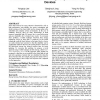Free Online Productivity Tools
i2Speak
i2Symbol
i2OCR
iTex2Img
iWeb2Print
iWeb2Shot
i2Type
iPdf2Split
iPdf2Merge
i2Bopomofo
i2Arabic
i2Style
i2Image
i2PDF
iLatex2Rtf
Sci2ools
142
click to vote
CODES
2009
IEEE
2009
IEEE
FRA: a flash-aware redundancy array of flash storage devices
Since flash memory has many attractive characteristics such as high performance, non-volatility, low power consumption and shock resistance, it has been widely used as storage media in the embedded and computer system environments. In the case of reliability, however, there are many shortcomings in flash memory: potentially high I/O latency due to erase-before-write and poor durability due to limited erase cycles. To overcome these problems, a RAID technique borrowed from storage technology based on hard disks is employed. In the RAID technology, multi-bit burst failures in the page, block or device are easily detected and corrected so that the reliability can be significantly enhanced. However the existing RAID-5 scheme for the flash-based storage has delayed response time for parity updating. To overcome this problem, we propose a novel approach using a RAID technique in flash storage, called Flashaware Redundancy Array. In this approach, parity updates are postponed so that they ar...
| Added | 20 May 2010 |
| Updated | 20 May 2010 |
| Type | Conference |
| Year | 2009 |
| Where | CODES |
| Authors | Yangsup Lee, Sanghyuk Jung, Yong Ho Song |
Comments (0)

